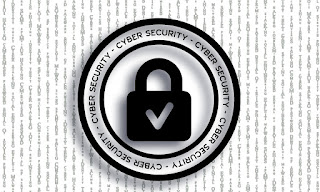 |
| Cyber Security - stay safe on the Internet! |
Strong passwords are your first defense against identity and information theft. The strongest passwords have at least 8 characters and make up a phrase. They include special characters other than letters (such as any of the Shift+number keys, “;”, “:”, etc.). One way to set up a strong password is to use a favorite phrase such as “Paint the town red” and then do a letter/number substitution or add some symbols. It could be “P*int the t0wn red?!&”. You get the idea. Security research shows longer passwords are far more secure; anything over 18 or 20 characters would take weeks, if not months or years, to break.
You should not use the same password for all your accounts and apps. If somehow a password is stolen, that opens up everything to the scammer. Instead, use different passwords for each account. Of course, that means you have many passwords to recall. Rather than try to remember them all (that would be impossible in this age of dozens of different accounts for different websites) or writing them down in a book (unless you encode your passwords with some really fancy techniques anybody can grab your book), or using an application such as Word and password-protecting it (who remembers to go back and change the password in a document? - nobody), try using a secure password manager, such as Keeper or LastPass.
These applications allow you to store all your login information under one password. Password managers can also automatically fill forms online or on your phone and allow you to synchronize your passwords across multiple web browsers and multiple devices. They can help you change your password and make sure the new password is saved. All you have to remember is one super-password to log on to the password manager. Again, make that password a phrase of some kind and add some symbols and numbers to it, then use that password over and over until you have it in muscle memory.
It may seem like an onerous chore to change passwords, but you can do it easily by clicking the “forgot my password” link when you sign into a website or app. You will be asked to answer one or more security questions such as the answer to a secret question, or the site may email or text you a code or temporary password. Password managers can help you ensure that your passwords stay secure.
It’s important to change your passwords on a semi-regular basis. To be super-safe, perhaps make a monthly task to change some of your passwords. Be aware that some websites limit the length of a password - for example, Second Life limits passwords to 15 characters. All password managers have a way to set the number of characters in a password it generates.
And lastly, if you are accessing a website that uses “http” in the URL, do not under any circumstances create a username and password there because web traffic using “http,” and not “https,” is not secure.
No comments:
Post a Comment
Got a Comment?